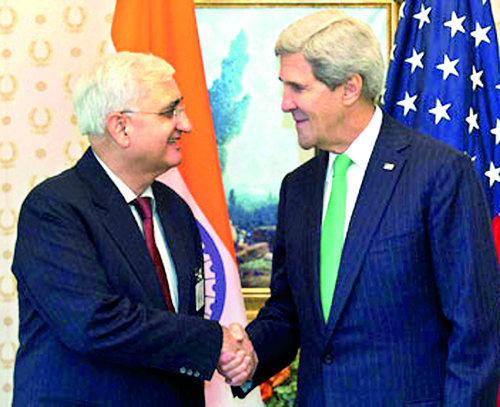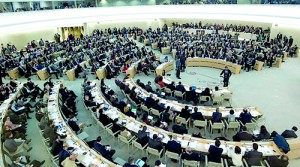Columns
India’s snub to Lanka: “We’re not brothers, we’re just pals”
View(s):Indian External Affairs Minister Salman Khurshid on Tuesday delivered a telling snub to Lanka when he declared to a visiting Sri Lankan media delegation in his New Delhi office: “We are not the big brother, we are just partners”
In one cutting sentence he effectively severed the umbilical cord that had stretched across the Palk Strait for centuries binding both nations in a special relationship of goodwill and cooperation born of a broad common cultural heritage.
Whilst certain other countries too share special relationships – the notable one being the transatlantic one between superpower America and downgraded Britain where the latter is referred to as America’s lap dog – the Indo Lanka bond has been based on kinship, with India held up as Lanka’s ‘Big Brother”; and in true Eastern fashion Lanka has been quite comfortable to genuflect to the bigger and older sibling of her Asian family.
Thailand, Burma, Malaysia and even China have been and are Lanka’s friends but India, from whence her people came, the central spring of her religion, the core source of her language, the inspirational fount of her arts and her culture, the hallowed land where the Buddha trod and set the Wheel of Dhamma in motion, has always been flesh and blood and, in modern historical times, accorded the status of the pater familias.
Shielding behind the bulwark of India’s physical bulk and moral weight, Lankan leaders confined themselves to playing ‘independence games’ in Lanka’s own little back garden and left to big brother India’s Gandhi, Nehru, Patel and congress company to stage the real life drama of the freedom struggle on Indian streets, in the fullest confidence that brother India’s labours and sacrifices will automatically fill Lanka’s larder with the grain sack of independence.
Ever since then, accepting ground realities, Lanka has complacently surrendered her foreign policy to the new Raj of the region with India taking it for granted that it should be so. This relationship was further consolidated with successive governments kowtowing in the manner of the Chinese showing deference; and continued until the advent of Tamil terrorism in Lanka. At that juncture, following the conflagration of 1983′s racial riots, with Tamil Nad demands on behalf of Lanka’s Tamils assaulting the Indian Central Government, the once cosy relationship of brotherhood turned cold.
It was thawed only when the then Lankan President J.R. Jayewardene who in the 1940′s had once advocated that Lanka should become another pranth of India, ended his 1986 SAARC Summit speech in Bangalore with the moving words, “I am a lover of India. I am a friend of her people. I am a follower of her greatest son, Gautama the Buddha.” that won him the lost heart of India.
But it was not to be for long. India’s own Tamil brood was baying for blood. The centre was stormed. And the kid brother was playing truant, refusing to toe the line. And thus the ensuing events of the last few years have led to this sorry pass today with India deeming it fit to make a damning public disavowal of any sort of kinship with Lanka with whom, historically, she shares so much.
Though Khurshid may have been diplomatically trying to respect Lanka’s status as a sovereign nation, and not the kept poodle of another, like Britain is viewed as that of America, and granting her parity with India by ostensibly according Lanka the dignified status of a partner, the recent actions of India seem to confirm the demotion of Lanka from being a close family member clasped tight to her bosom to a mere associate preferably to be kept at arm’s length at a safe distance.
Having taken for granted the ‘sibling sympathy’ factor where any slight transgression would receive a slight rap on the knuckles and be forgiven, Lanka ignored the brewing discontent that would rise to a boil in the Indian galley and force the parting of ways.

India refuses to reveal the stance it will take on the US-sponsored resolution against Lanka at the UNHRC in Geneva(see pic). Top: India’s External Affairs Minister with US Secretary of State John Kerry.
No wonder it was a rude awakening for Lanka to discover on March 21st two years ago that India had slapped her on her face in front of the international community while she was blissfully asleep and had crossed the divide onto the enemy camp without notice by voting against Lanka in favour of the United States sponsored resolution censuring Lanka for alleged human rights violations.
Dazed by India’s unprecedented shift and with unconcealed bitterness the Lankan Foreign Minister G.L. Peiris responded with a veiled attack on India that only made matters worse. He said the most distressing feature was that voting at the Council was now determined not by the merits of a particular issue but by strategic alliances and domestic political issues in other countries, a reference to Tamil Nad’s pressure on the Indian centre.
The learned law professor, enveloped by shock, perhaps, failed to realize that strategic alliances and domestic political issues dictated international power politics and that merits, even if considered and taken into account were ultimately dependent on the subjective opinion, bias, and prejudices of the arbiter.
The United Nations’ assembly hall is a gladiators’ arena where interests of nations are advanced ruthlessly with no quarter given, not a quaint ecclesiastical court of law where merits and morals form the honest coinage in the dispensation of justice.
 Last year too when the United States brought a further resolution against Lanka on the same subject, India repeated the same travesty of her model role as the moral light of the world.
Last year too when the United States brought a further resolution against Lanka on the same subject, India repeated the same travesty of her model role as the moral light of the world.
Though once bitten Lanka does not seem twice shy and has continued to beseech India’s blessings, begging until it hurts, her forgiveness. But to no avail. Last year witnessed the impervious manner in which the Indian Prime Minister had decided to conduct himself toward Lanka. Even though accorded the singular honour of being personally invited by the Foreign Minister G.L. Peiris on behalf of President Rajapaksa – an honour accorded to no other Head of State – to grace the Colombo CHOGM 2013, Manmohan Singh did not announce whether he will be attending or not but kept Lanka in suspense until the eleventh hour when he summarily declared his ‘regrets’ and kept away.
Even today India refuses to reveal the stance she will take on the US sponsored resolution against Lanka on human rights but sadistically stays silent while Lanka writhes in pain at her feet for an answer; while her External Affairs Minister Khurshid says, in an obvious reference to India herself, “that the Lankan leadership should look at possible ways to avoid the hostility of people and countries that matter.”
Khurshid cannot seem to rid his conditioned mind the Big Brother role India has played in her relationship with Lanka, the superiority of the Indian Bapu over the Lankan Thambi.
Only moments after disowning Lanka as India’s kid brother and placing her on an equal pedestal as a partner, Khurshid goes onto advise Lanka, once again adopting the role of Big Brother and, pontificating in the manner of a family elder advising the younger incorrigible sibling to ward him off from his wayward ways, he says Lanka should not isolate herself, must show commitment, don’t let the ego get in the way, do not be too sensitive and over react to what the world says, do not change certain things even if you have the power to do so. Good advice. No doubt about it. Every word worth its weight in gold and should be taken to heart and followed by Lankan leaders.
But then Khurshid goes onto deliver the coup de grace. He declares India’s ultimatum, the price for her support. He says “”For us to help, you should be doing things that we would be able tell the world: “Look at what Sri Lanka has done.” In other words India would only support Lanka if she faithfully follows India’s dicta and obediently does what India wants her to do in India’s own interest.
That then is the new partnership based on equal terms that India has forged in an Indian furnace engraved on Indian steel for Lanka to etch her allegedly bloodstained fingerprint as revealed by her External Affairs Minister Khurshid this week.
But Lanka has one trump card and now is the time to play it.
Why is it that the ambit of the US sponsored resolution against Lanka on alleged human rights violations is limited to the last two months of the war? Why does it not seek to extend the brief to cover the entire period of conflict that claimed over a hundred thousand lives? Were there no rights violations before 2009 or if there were, are they not of any importance?
Do not the relatives of those slaughtered, tortured, raped or missing have any right to justice, to see the murderers, the torturers, the rapists, the abductors brought to trial and punished for their villainy? Are the members of the Lankan armed forces and the Lankan Presidents of those years to escape scot free even if they were guilty of any alleged crimes?
Or is it the case that the terms of reference do not cover the entire period because it will touch upon India’s Achilles heel and will also focus upon the Indian Army’s actions whilst they occupied the North of Lanka?
Khurshid says that the Indian Army came to Lanka on an invitation from the Lankan President Jayewardene and left when they were requested to do so by his successor President Premadasa. He conjures a picture of a disciplined army which was formally invited in and an Indian Government which acted in all matters correctly in accordance with international law; and not an Indian army who defecated on the ground it was occupying and an Indian Government that was relieved to withdraw its forces immediately upon request lest evidence of its carnal incontinence were soon discovered and exposed.
Then what better place for India to be in today than at the head table overseeing the final draft of the US resolution indicting Lanka and ensuring simultaneously that India’s own dubious role in the war is strictly excluded from the text of the final document? Or else India may find herself also in the dock with Lanka facing the same rap not as brothers but as co-partners for alleged war crimes.


